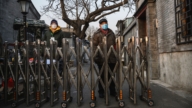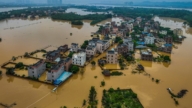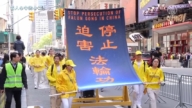【新唐人2013年01月23日讯】近年来中共政权的合法性越来越受到质疑,中国民众对于中共官员权力不受监督和制约,所造成的集体贪腐淫乱深恶痛绝,除不断爆发底层民众的抗暴事件,中产阶层要求官员信息透明的呼声也越来越高。美国媒体指出,这种呼声对一党专政构成了本质上的挑战。
新年伊始,中国南部的广州爆发了反审查街头示威,随后,北方地区空气污染引发了网上强烈抗议,山西工厂泄露的有毒化学物质也在周边城市引起了恐慌,网民在网上要求政府如实公布自来水的质量,在北京饮用水安全部门工作的研究员夫妇指称,他们了解幕后数据,20年来从不喝一滴自来水。民众这些年来积压在心头的不满情绪日益升级。
《纽约时报》指出,多年来,很多观察人士坚称,中共威权体制之所以能够维持,是因为民众与中共做了一笔大交易:中共负责保证经济增长,人民则不得过问他们的统治模式。现在,因为经济发展而提高了生活水平的很多人,都开始终结他们与政府的协议,表达意愿的方式也比以往任何时候都更加大胆。这群人中既有亿万富翁也有学生,既有影视明星也有家庭主妇。而发起挑战的人大多都曾是中共最热心的支持者,也就是那些受益于30年经济发展的中产阶级与富裕家庭。
房地产巨头潘石屹是引领变革呼声者的人之一,他要求政府公开空气中潜在的致命颗粒物PM2.5水平,并推动官方公布74个城市PM2.5水平的决定。
中国公民监政会发起人郭永丰:“只要是有些良知,他方便在底下这个微博经常说真话,越来越多的人说真话,唤醒了很多有良知的人,原来都不敢说,现在都敢说了,越来越多的人已经认识了社会的弊病,也对这个社会觉得有义务有责任了,其中也有些中产阶级。”
《纽约时报》指称,倡导推翻共产党的人寥寥无几,很多人只是希望当局能为人们的生活安全提供更多保障,但是他们要求的透明度,对这个一党专政的国家发出了本质上的挑战。
郭永丰认为,潘石屹和任志强等一少部分富人,他们的民主思想已经非常到位,他虽然没有直接要求中共下台,但是他们在网路上影响非常大,对推倒中共红墙起到了作用。
郭永丰:“共产党一党专政结束是迟早的事,就是看什么时候,网路上民意的阀门已经打开了,就看实践性,现在很多人在搞‘饭醉’,‘同城饭醉’,就是变相的聚会,在网上认识,网上聚会。”
时政评论家蓝述指出,中共为了维持独裁统治,篡权后把中国人搞得一穷二白,在他们统治遭遇危机时又搞起了所谓改革开放,在这种情况下形成的中产阶级,要求民主自由是自然而然的。
时政评论家蓝述:“人有三个权力应该得到保证的。一个是生存的权力,一个是追求幸福的权力,另外一个就是自由的权力。那么把这三个权力跟中国现在形成的中产阶级你去做一个比较,就不难得出结论。因为这些人生存的权力已经有了,追求幸福的权力他也有了,剩下的一个就是自由的权力。”
不过蓝述认为,大多数中产阶级,不愿意冒险失去他们大半生经营所得到的财富,普遍比较胆小。但是他们中只要有少部分能走出来和中国的中下层联合,就能起到足够的作用。
蓝述:“但是他只需要有一部分,比较有理想,对外面的社会比较了解,对中国历史比较有研究的这批人,数量非常少的这一批中产阶级,他能够和冲击中共目前极权的中下层主流结合在一起,就能完成开创中国新时代这么一个局面。”
报导指出,有些中国人,尤其是年轻一代人,都开始意识到安全的生活不只是有赖于政府对人们物质需求的满足,还有赖于捍卫一系列原则,其中最重要的是言论自由。如果执政党无法自律,人们就要对他们进行监督。
采访编辑/刘惠 后制/君卓
Middle-Class Joined to Challenge the CCP Regime
Recently, more and more doubts are being expressed on
the legitimacy of Chinese Communist Party’ (CCP) regime.
Chinese people deeply hate CCP officials’ unsupervised
and unrestrained collective corruption and promiscuousness.
In addition to grassroots people’s uprising events, now
the middle class is also raising its voice, asking officials to declare their properties publicly.
U.S. media point out that this voice is essentially
a challenge to the one-party dictatorship.
At the beginning of this year, anti-censorship demonstrations
broke out on the streets of Guangzhou in southern China.
They were followed by strong online protests
against air pollution in the northern regions.
Shanxi plant leaking toxic chemicals
also caused panic in the surrounding cities.
Netizens demanded from the government to publish
data about the quality of the drinking water.
A couple, researchers in Beijing’s drinking water security
sector, disclosed they have not drunk tap water in 20 years, as they are aware of the behind-the-scenes data.
The discontent people have all these years
keeps escalating.
The New York Times pointed out that over the years
many observers have insisted Chinese people made a deal with the CCP to maintain its authoritarian regime:
CCP is responsible to ensure economic growth,
and people do not question their rule.
Now many, whose living standard has improved with the
economic growth, are ending their agreement with the CCP.
They are more daring than ever before
in expressing their opinions.
This group includes people from billionaires to students,
from movie stars to housewives.
Those who initiated the challenge are mostly
the once enthusiastic CCP supporters,
the middle-class and wealthy families,
who benefit from the 30-year economic development.
Real estate tycoon Pan Shiqi is one of those,
who appeal for changes.
He asked the government to publish the data about the
potentially fatal air pollution of level PM2.5, and prompted the officials to admit the existing PM2.5 in 74 cities.
Guo Yongfeng, founder of Chinese Citizens Monitoring
Council: “As long as one has a conscience and a channel to tell the truth via microblog,
then more and more people
will be telling the truth to awake others.
Those who dared not say anything before,
are speaking up now.
More and more people have recognized the social issues
and feel the sense of responsibility. Some of them are from the middle class."
The New York Times alleged that few advocate
overthrowing the CCP.
A lot of people just want the authorities to provide
more protection for the safety of people’s lives.
But they are asking for transparency,
which is an essential challenge to the one-party dictatorship.
Guo Yongfeng thinks a small number of rich people like
Pan Shiyi and Ren Zhiqiang have matured democratically.
Although they do not ask the CCP to step down directly,
they have large impact on the internet and have played a role in the fall of CCP’s red walls.
Guo Yongfeng: “The CCP one-party dictatorship will end
sooner or later, the question is when it will happen.
Now public opinions are open on the internet.
Many people are now gathering and socializing online.”
Commentator Lan pointed out that in order to maintain
its dictatorship, the CCP made China extremely poor.
And started the so-called reform
when it was facing a crisis.
It is natural for the middle-class formed in this situation
to call for democracy and freedom.
Lan Shu: “Human beings have three guaranteed rights.
The right to live, to be happy, and to be free.
The middle-class in China now has the right to live,
to pursue happiness, the only one left is the freedom."
But Lan thinks the majority of the middle class people
don’t want to risk the wealth, gathered throughout their lives.
However, it will be sufficient if even a small part of them
can come out and collaborate with the grassroots’ people.
Lan Shu: “To start a new era in China, only a small number
of middle-class people are needed.
They need to have ideals, better understanding of the world,
and a good knowledge of the Chinese history.
And to join the mainstream of the middle and grassroots
levels, who are protesting against the CCP totalitarianism. This will start a new era in China.”
The report pointed out that some of the Chinese people,
especially the younger generation, have begun to awake.
They realize that life security goes beyond
the material things granted by the government.
There is also a set of principles to defend. If the ruling party
is incapable of self-discipline, then people need to oversee it.


























